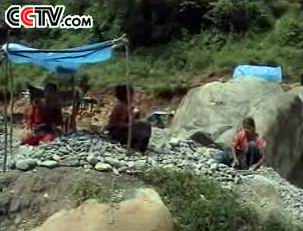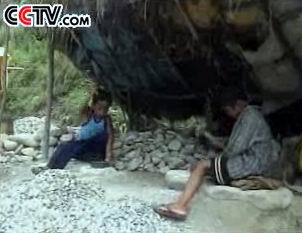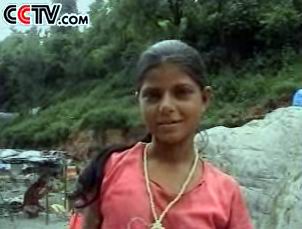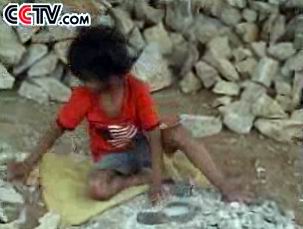Source: CCTV.com
01-12-2007 16:07
Nepal is considered one of the world's poorest and most underdeveloped countries. Child labor is not uncommon in a country dominated by agriculture. Constant poverty, unemployment and the lack of basic needs often force parents in villages to send their children to work. Many must work in a variety of trades even though the work is often hazardous.
In today's Working Asia, Nav Raj Pokharel, of NTV Nepal, takes a look at the dangerous conditions faced by those working in stone quarries.
 |
Be sure to join us tomorrow as we explore the environment Pakistani children must face as they work under oppressive conditions.
This boy usually gets up early in the morning from this bed, prepares to go to school.
This 13-year-old boy is Kumar Lama. Every day he breaks stones after he comes from school and whole day when he has holiday in the school. He earns up to Rs.20 rupees at maximum (0.20 $) a day.
The money he earns from crushing the stones, he spends it to purchase stationeries and school fees. “I crush some 4 buckets of stone. I use the money to support my family and to purchase stationeries.” Kumar Lama said.
He has a sister, Sunita; she does not go to school. His family has been working in this area for a long time. His father, Tsering Lama and his mother has been crushing stones in this place for last 18 years. After their hard work the whole day, they hardly earn Rs.150 (approx.2 $) a day.
 |
The money they earn is not enough to feed the whole family, to send their children to school and to maintain other expenses.
This is the story of this Lama couple and his son. But this is not the only story in the capital city of Kathmandu. We can see this situation being repeated in almost everywhere at a riverbed. For en example, at the riverbed of Agra Khola, there are some500 stone crushers from 150 families living in Dhading District, adjoining to the capital.
When the parents work here, their children help them equally. Some of their children go to school and help them when they come back from the school. Some of them do not even go to school. They crush stone whole day.
 |
This girl’s name is Anita Puri. She crushes stone to feed her family. “I work here to feed my family. I have no time to go to school. My father is too old to work. My mother alone does not earn enough to feed the family.” Anita Puri said.
There are NGOs also working in this area to help the children go school. They have opened a primary school near by their work place. They teach the children here during morning time, but it is not helping them as their economic situation is not improving . So the children resume to help their family.
Shambhu Jung Karki of Bright Future Child ED Project said “We have been working but we see many dropout cases from school. This year, the number of students is not improving as well”
 |
Same experiences Madan Chepang has to tell. He is chairperson of Nepal Chepang Association, District working committee. He runs education programme for the children of Low Cast people called Chepang. “This year is no better then previous year to enroll Chepang students in the school. “Madan Chepang said.
Besides that, the government has also provided free school for primary level. The dropout situation has not improved. People living in grass root realize that peripheral supports do not bring about changes if core problem of poverty is not addressed.
Editor:Du Xiaodan
